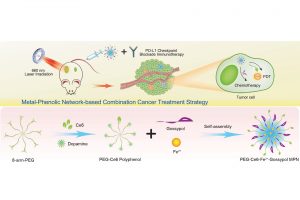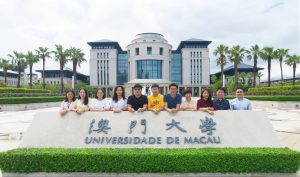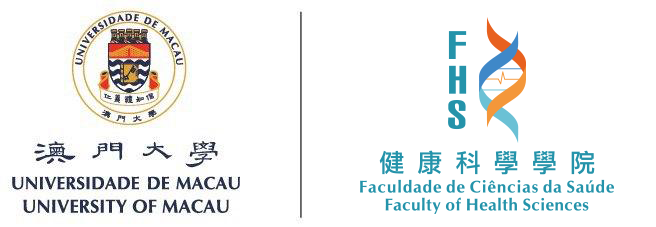Yunlu DAI, an assistant professor in the University of Macau (UM) Faculty of Health Sciences (FHS), and his research team, have successfully synthesised a polyphenol-based nanomedicine that can evoke highly efficacious cancer immunosurveillance while localising therapy on primary tumour and minimising systemic side effects. The study has been published in the internationally renowned journal Angewandte Chemie International Edition.
Recent studies have discovered the potential of polyphenols in the biomedical field, especially in terms of their anti-tumour, anti-oxidation, and anti-thrombosis capacities. Phenolic ligands of polyphenols can coordinate with metal ions to fabricate metal-phenolic networks (MPNs), load chemical drugs, encapsulate enzymes easily, and then release these functional components to tumour sites by virtue of the unique pH responsiveness of the nanoframework. In this study, a novel polyphenol-based nanocomplex was prepared through a metal-polyphenol coordination process by encapsulating a natural polyphenol gossypol and a newly synthesised polyethylene glycol-Chlorin e6 (Ce6) polyphenol derivative.
Natural gossypols stem from cotton plants and recent studies have shown that they have anticancer properties without obvious systemic side effects caused by traditional doxorubicin or cisplatin. The polyphenol-analogous structure allows this natural drug to intercalate into MPN skeleton in an easy and stable manner. Inspired by this finding, the team designed a new polyethylene glycol (PEG)-chlorin e6 (Ce6)-Fe2+-gossypol MPNs (termed PFGs) via metal-polyphenol coordination. Photosensitiser Ce6 and dopamine were conjugated with PEG to form PEG-Ce6 polyphenol. Fe2+ can thus integrate the phenolic moieties of gossypol and PEG-Ce6 polyphenol to form the MPNs. The PFGs accumulated at tumour sites after intravenous injection and showed efficient chemotherapy/PDT-induced ICD performance upon 660 nm laser irradiation, which was confirmed by the release of damage-associated molecular patterns (DAMPs), maturation of dendritic cells (DCs), and the generation of inflammatory factors. Additionally, anti-programmed cell death ligand-1 (PD-L1) antibodies were then applied in vivo to enhance PFGs-based immune stimulation. Such double stimulation-induced deep immune activation achieved effective cytotoxic T lymphocytes (CTLs) infiltration in tumour tissues, which remarkably inhibited tumour proliferation and metastasis.
Prof. Dai is the corresponding author of the study. PhD students Zhan ZHANG and Wei SANG, as well as UM Macao Postdoctoral Fellow Lisi XIE are the co-first authors. Associate Professor Zhen YUAN, Assistant Professor Qi ZHAO, postdoctoral fellow Bei LI, Jie LI, and PhD students Wenxi LI and Hao TIAN also made important contributions to this study. The project was funded by the Science and Technology Development Fund, Macao SAR (file number: 0109/2018/A3 and 0011/2019/AKP) and UM (file number: SRG2018-00130-FHS).
You can also find more details at: https://onlinelibrary.wiley.com/doi/10.1002/anie.202013406

The synthesized polyphenol-based nanomedicine inhibit tumor growth and metastasis effectively

Dai Yunlu (1st from right), Zhang Zhan (2nd from right), Xie Lisi (4th from right), Sang Wei (4th from left)


